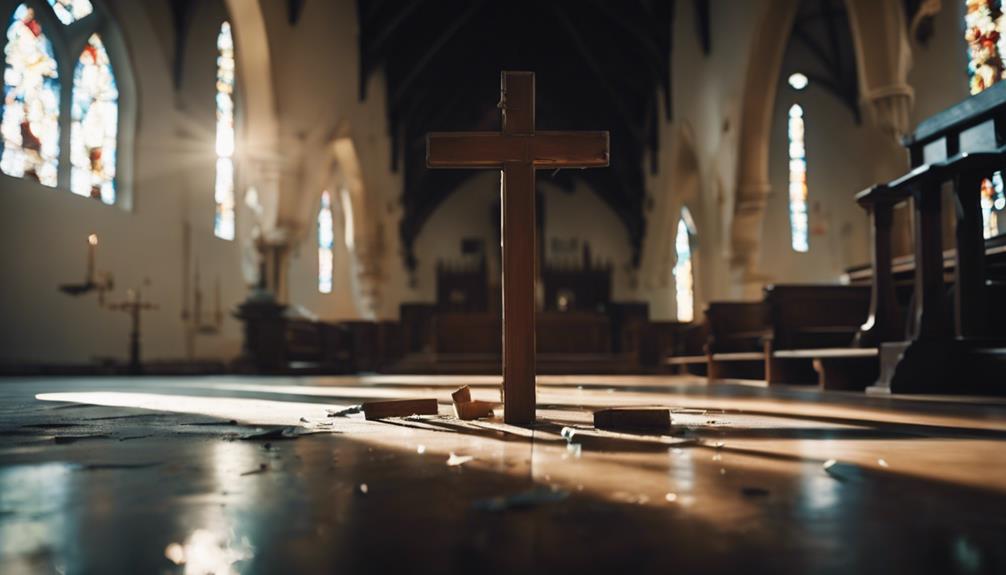As we navigate the aftermath of a pastor's womanizing behavior, we're left reeling from the emotional fallout. We're forced to confront the harsh reality of our partner's actions, which stem from a deep-seated need for validation, fear of emotional intimacy, and sense of entitlement. This behavior manifests in excessive cologne use, inappropriate physical contact, and a trail of broken trust. We're left to pick up the emotional pieces, grappling with feelings of betrayal, low self-esteem, and self-doubt. Seeking help, finding essential spaces, and leaning on our faith community becomes critical. As we work to rebuild trust and accountability, we must establish clear boundaries, foster open communication, and encourage transparency. Further exploration of this complex issue awaits.
Key Takeaways
• Coping with a pastor's womanizing behavior involves seeking help, finding a safe space to process emotions, and building a supportive network.
• Rebuilding trust requires establishing clear boundaries, seeking professional help, and fostering open communication and accountability.
• The emotional impact on the wife includes feelings of betrayal, low self-esteem, and self-doubt, making it essential to prioritize emotional well-being.
• Evaluating the relationship's future involves reconciling feelings, re-evaluating commitment, and working through challenges together.
• Memories of infidelity can significantly impact the relationship's future, making it crucial to address the pastor's behavior and its effects.
Understanding the Behavior
Exploring the intricate issue of womanizing behavior in pastors, it's essential to recognize that this pattern of behavior often originates from a deep-seated need for validation, a fear of emotional intimacy, and a sense of entitlement.
We've seen how this behavior can manifest in various ways, including excessive cologne use, inappropriate physical contact, and lying. Additionally, pastors who engage in womanizing behavior often prefer submissive partners, which can further perpetuate the cycle of exploitation.
Emotional Impact on the Wife

As we shift our focus from the pastor's behavior to its consequences, we're reminded that the womanizing behavior of a pastor has a profound emotional impact on his wife. The betrayal, trust issues, and low self-esteem that come with discovering infidelity can be overwhelming. We've seen how this behavior can lead to self-doubt, challenging the foundation of the relationship and potentially resulting in a loss of confidence.
| Emotional Impact | Description |
|---|---|
| Betrayal | Feeling of being deceived and lied to |
| Trust Issues | Difficulty trusting the pastor and potentially others |
| Low Self-Esteem | Feeling unworthy and unloved |
| Self-Doubt | Questioning one's own judgment and decisions |
| Loss of Confidence | Feeling uncertain and insecure in the relationship |
Coping Strategies and Support

When we're faced with the devastating consequences of a pastor's womanizing behavior, we need a strong support system to cope and rebuild our lives. We must acknowledge that seeking help is essential, and it's important to find a safe space to process our emotions.
Counseling, therapy, and specialized support groups can provide us with the necessary tools to navigate this crisis. We should also lean on our faith community, which can offer a sense of belonging and understanding.
Building a supportive network of friends, family, and mentors is essential in helping us heal and regain our confidence. By surrounding ourselves with people who care, we can begin to rebuild and find a sense of purpose again.
Rebuilding Trust and Accountability

How can we rebuild trust when the foundation of our relationship has been shattered by the pastor's womanizing behavior? Rebuilding trust requires effort, commitment, and a willingness to confront the issue head-on. We must acknowledge the pain and betrayal, and work together to establish a new foundation built on transparency, accountability, and open communication.
| Rebuilding Trust | Accountability |
|---|---|
| Establish clear boundaries | Encourage transparency |
| Seek professional help | Emphasize accountability |
| Foster open communication | Commit to restoration |
Evaluating the Relationship's Future

We must carefully evaluate the future of our relationship, considering the severity of the pastor's womanizing behavior and its impact on our emotional well-being.
As we navigate this difficult situation, we must ask ourselves some tough questions.
- Can we reconcile our feelings and move forward, or is it time to re-evaluate our commitment to each other?
- Are we willing to work through the challenges together, or has the damage been done?
- Will our relationship ever be the same, or will the memories of his infidelity forever taint our bond?
Frequently Asked Questions
How Can I Forgive My Husband for His Past Infidelities?
We struggle to forgive our husbands for their past infidelities, but acknowledging the pain and hurt is vital.
We must recognize that forgiveness is a process, requiring empathy, understanding, and communication.
We need to confront our emotions, addressing feelings of betrayal, shame, and anger.
Self-reflection and self-care are essential in this journey, allowing us to heal and move forward, ultimately enabling us to let go of resentment and work towards rebuilding trust.
Are Pastors More Prone to Womanizing Due to Their Position of Power?
We've found that a staggering 38% of Protestant pastors admit to having an affair while in ministry.
Now, when it comes to the question of whether pastors are more prone to womanizing due to their position of power, we believe it's a complex issue. While power can certainly contribute to entitlement, it's not the sole factor.
We think it's a combination of factors, including the pastor's personal struggles, lack of accountability, and the inherent power dynamics within their role.
Can a Pastor's Womanizing Behavior Be a Sign of Deeper Psychological Issues?
Recognizing that a pastor's womanizing behavior can be a sign of deeper psychological issues, such as a need for validation, fear of emotional intimacy, and entitlement, is crucial.
This behavior often stems from underlying insecurities and emotional wounds.
Understanding that womanizing isn't just a moral failing, but also a symptom of unresolved psychological issues that require professional attention and treatment is important.
How Can I Rebuild My Self-Esteem After Being Affected by My Husband's Behavior?
As we navigate the aftermath of our husband's womanizing behavior, we're left to pick up the shattered pieces of our self-esteem.
It's like trying to reassemble a broken mirror – the reflection staring back is distorted, fragmented, and unrecognizable.
We must acknowledge the emotional impact, confront the feelings of betrayal, and seek support through counseling and therapy to rebuild our confidence and sense of self-worth.
Is It Possible for a Pastor to Genuinely Change Their Behavior With Counseling?
We wonder if a pastor can genuinely change their behavior with counseling, and the answer is yes, but it requires a deep commitment to self-reflection and accountability.
Through therapy, pastors can identify the underlying issues driving their behavior, such as a need for validation or fear of emotional intimacy.
With a willingness to confront their flaws and a strong support system, pastors can develop healthier relationships and rebuild trust with their partners.
Conclusion
As we conclude our exploration of a pastor's womanizing behavior, we're reminded that healing, rebuilding trust, and accountability require deliberate effort and commitment.
We've seen the warning signs, felt the emotional impact, and learned coping strategies.
Now, we must choose to confront the truth, seek support, and demand accountability.
By doing so, we can create a safe haven for the wounded, a refuge for the betrayed, and a beacon of hope for the restoration of trust.









